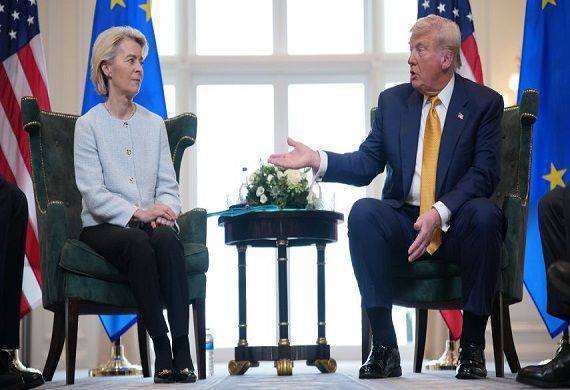US and EU Secure Trade Deal, Avoiding Tariff War
By Global Leaders Insights Team | Jul 28, 2025

The United States and European Union reached a major trade agreement on Sunday, setting a 15% tariff on most EU goods entering the U.S., sidestepping a potential trade war between two of the world’s biggest economies.
The deal was announced by U.S. President Donald Trump and European Commission President Ursula von der Leyen at Trump’s golf resort in Scotland after months of tough negotiations.
This agreement, similar to a recent U.S.-Japan deal, includes $600 billion in EU investments in the U.S. and boosts EU purchases of American energy and military equipment.
Trump called it “the biggest deal ever,” highlighting stronger ties across the Atlantic. Von der Leyen described the 15% tariff—half the previously threatened 30%—as “the best we could get.” It covers products like cars, pharmaceuticals, and semiconductors.
- US-EU Trade Deal Sets 15% Tariff, Averts Major Transatlantic Trade War
- $600 Billion EU Investment in US Sealed in Landmark Trade Agreement
- Trump, von der Leyen Announce Historic Tariff Deal Covering Cars, Pharma, and Semiconductors
While the deal brings calm, some issues remain unresolved. The U.S. will keep its 50% tariffs on steel and aluminum, though talks about switching to a quota system are ongoing. Aircraft, certain chemicals, generic drugs, and key raw materials are exempt from tariffs, with efforts to add more items to this list. Discussions about tariffs on spirits are still in progress.
German Chancellor Friedrich Merz praised the deal, saying it protects Germany’s car industry, which had faced a 27.5% U.S. tariff on auto imports. However, Bernd Lange, a key figure in the European Parliament’s trade committee, criticized the tariffs as unfair, warning that the EU’s massive $750 billion commitment to buying U.S. energy and weapons could hurt its own economy.
The euro gained 0.2% against other major currencies after the announcement. Experts, like Carsten Nickel from Teneo, note that the deal’s broad nature could lead to disagreements down the road, as seen with the Japan agreement.
Also Read: Trump Targets Google Gemini 'Woke' Row, Pichai Calls It 'Unacceptable'
Trump, focused on cutting the $235 billion U.S.-EU trade deficit, can still raise tariffs if the EU doesn’t meet its investment promises. This deal, part of similar agreements with Britain, Japan, Indonesia, and Vietnam, moves the U.S. closer to reshaping global trade, though Trump’s goal of “90 deals in 90 days” remains out of reach.
.jpg)



